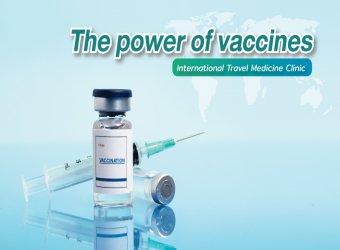Health Checkup Guidelines Before Studying Abroad
(International Travel Medicine Clinic) article author : Vorapoj Norasucha, M.D.

Health Checkup Guidelines Before Studying Abroad
Studying abroad is a once-in-a-lifetime experience that many Thai students aspire to. Whether it's a short-term exchange program or a long-term study program from elementary, secondary, or university levels, and even vocational, religious studies, or personal development, studying abroad offers a plethora of opportunities.
A pre-departure health checkup is a mandatory requirement for most international institutions as part of the application process. This is to ensure that students are in good health and do not have any contagious or serious diseases that could potentially affect the health of others within the institution.
The specific health checkup requirements can vary from country to country and institution to institution, depending on the level of study, faculty, and the policies of each country. For example, the health checkup requirements for a high school student and a graduate student, or for an arts student and a medical student, can be significantly different. Similarly, the basic immunization requirements in the United States and Thailand differ. Therefore, Thai students planning to study in the United States must verify their immunization records against the U.S. requirements. It is advisable to consult with the institution beforehand or bring the institution's health form during the checkup to ensure that the examination is appropriate and meets the specific requirements of the institution or country.
Common health checkup items and immunization records include:
- General physical examination, including vital signs, weight, and height.
- Vision test and color blindness assessment.
- Blood tests:
- General blood tests, such as blood type (ABO) or complete blood count (CBC).
- Screening tests for diseases or antibodies to diseases, such as HIV, syphilis, and hepatitis B.
- Urine test:
- Urinalysis, drug screening, or pregnancy test.
- Hearing test (Audiogram).
- Chest X-ray.
- Tuberculosis screening: Since Thailand is considered a country with endemic tuberculosis, international institutions often recommend that Thai students undergo tuberculosis screening. There are three main testing methods (depending on the institution's approval):
- Tuberculin skin test (PPD test or Mantoux test), with results available in 48-72 hours.
- IGRA test (Interferon gamma release assay test).
- Chest X-ray.
- Other tests: ECG, mental health screening, stool parasite examination, etc.
Immunization records according to the destination country's immunization policy, such as proof of immunity or vaccination against measles, mumps, rubella (MMR), varicella, tetanus, diphtheria, pertussis (Tdap), and meningococcal disease.
Please note that the specific tests and tuberculosis screening methods may vary depending on the institution. The above list is a common example.
To prepare for the health checkup, please bring all necessary documents, especially copies of your ID card/passport, a photo, and the institution's form (if any). If you have any previous medical records or vaccination booklets, please bring them along. Provide complete information about your medical history, medications, and supplements for the doctor's consideration. If you have any further questions, please contact...
Dr. Sakan Jernsakulsai/Dr. Worapot Traipsrisawat





